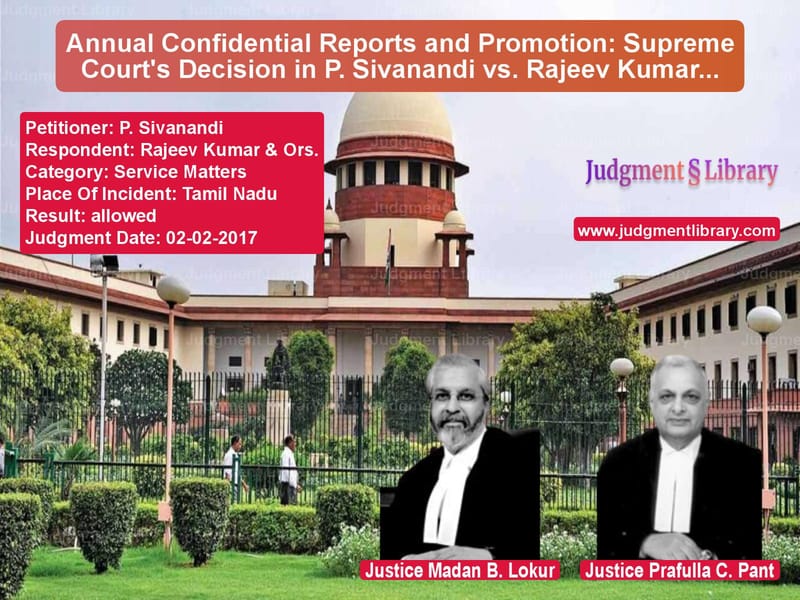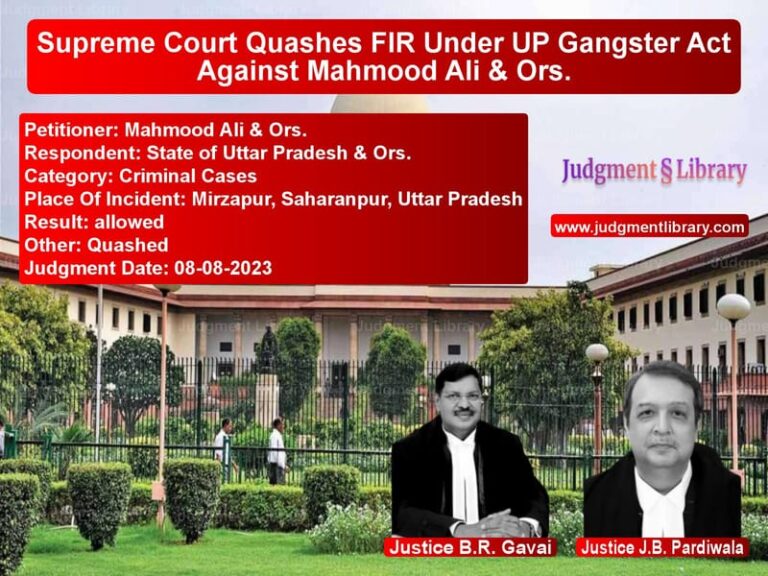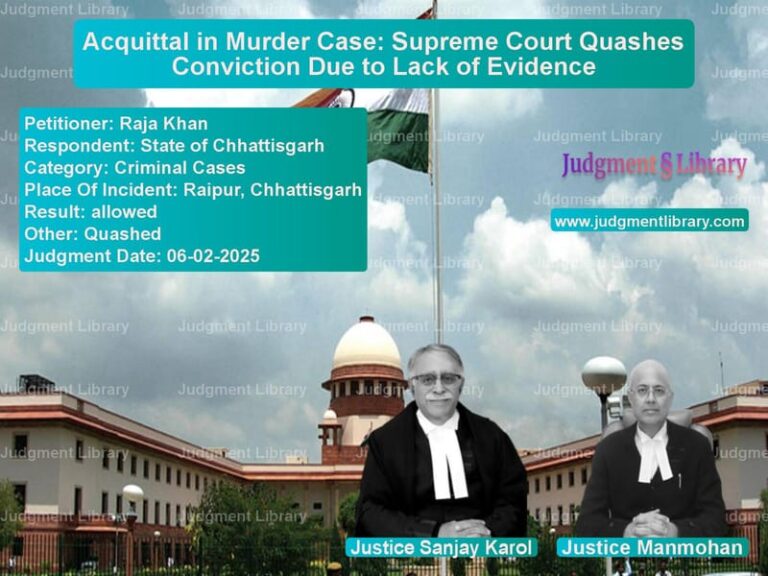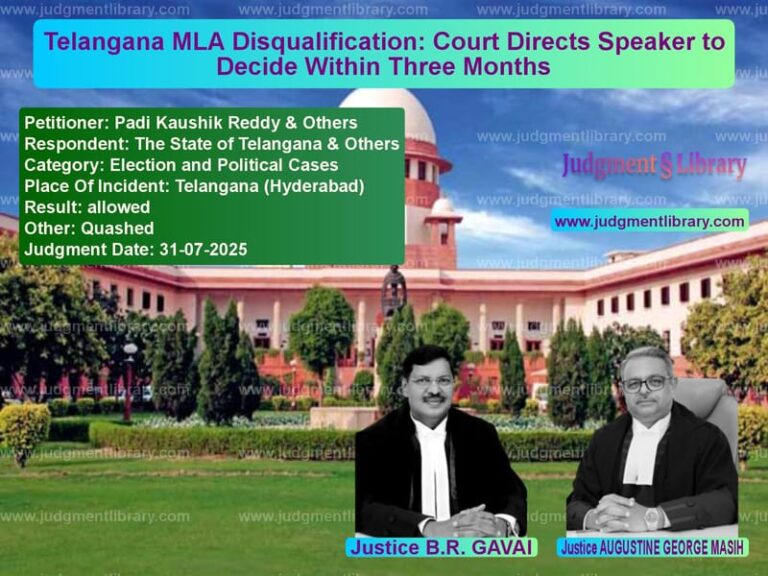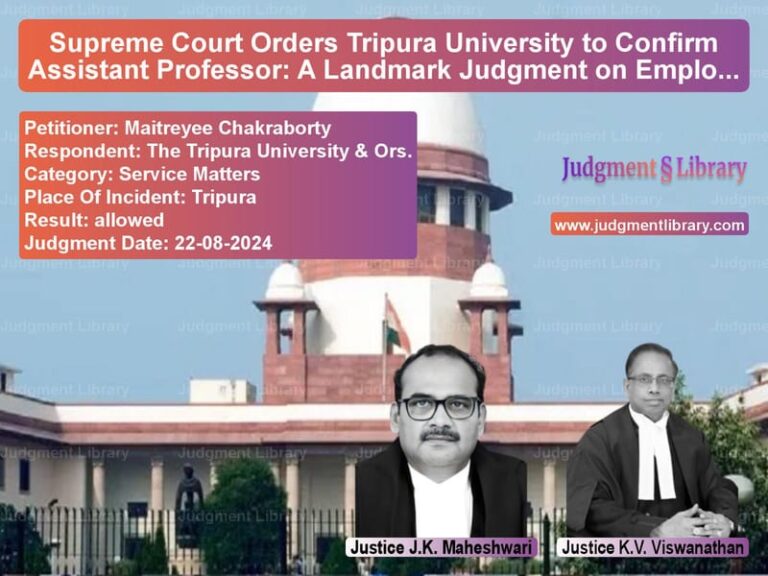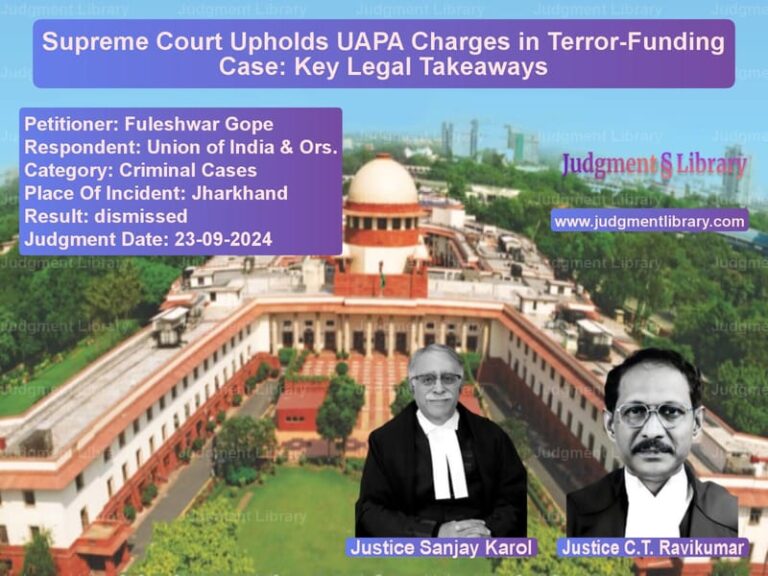Annual Confidential Reports and Promotion: Supreme Court’s Decision in P. Sivanandi vs. Rajeev Kumar Case
The Supreme Court of India delivered a significant judgment on February 2, 2017, in the case of P. Sivanandi vs. Rajeev Kumar & Ors., addressing a critical question regarding Annual Confidential Reports (ACRs) and their impact on service records and promotions. The case revolved around whether an ACR that was written after a delay could be ignored for promotion considerations.
The Court held that an officer’s ACR forms an essential part of their service record and cannot be disregarded merely because it was written after some delay. The judgment overturned the earlier ruling by the Madras High Court, which had upheld a decision by the Central Administrative Tribunal (CAT) to exclude a delayed ACR from consideration.
Background of the Case
The appellant, P. Sivanandi, was directly recruited as a Deputy Superintendent of Police in the Tamil Nadu Police on May 6, 1985. He was considered for promotion to the Indian Police Service (IPS) during the 1994-95 selection cycle.
A Select Committee evaluated his service records, including ACRs for the period from April 1, 1989, to March 31, 1994. However, two critical ACRs were missing:
- The ACR for 1992-93
- The ACR for the period April 1, 1993, to July 15, 1993, which had not been written at the time
Despite the missing ACRs, the Select Committee graded Sivanandi as ‘Good’. He was considered for promotion in the subsequent 1995-96 cycle and was eventually promoted to the IPS with an allotment year of 1993.
Challenge and Legal Proceedings
The selection process for 1994-95 was challenged by some aggrieved officers before the Central Administrative Tribunal (CAT). The CAT ruled that the selection should be set aside and ordered a fresh selection process. This ruling was upheld by the Supreme Court in an earlier case, Christopher Nelson vs. UPSC & Ors. (February 20, 2002).
Following this, a Review Select Committee was constituted in 1999 to reconsider promotions for 1994-95. By this time, the missing ACR for 1992-93 and the ACR for April 1, 1993, to July 15, 1993, had been located. The latter was written on November 14, 1994, reviewed on January 19, 1996, and accepted on January 27, 1996. These ACRs were considered by the Review Select Committee, which upgraded Sivanandi’s rating to ‘Very Good’ and changed his allotment year to 1991.
Arguments by the Respondents
A group of officers, dissatisfied with Sivanandi’s selection, approached the CAT again in 2005. They argued that:
- The ACR for April 1, 1993, to July 15, 1993, should not have been considered because it was written after a long delay.
- The Review Select Committee had acted beyond its jurisdiction by considering a delayed ACR.
- Sivanandi’s selection was, therefore, invalid.
The CAT ruled in favor of the respondents and excluded the ACR from consideration, effectively setting aside Sivanandi’s promotion.
High Court’s Decision
Sivanandi challenged the CAT’s ruling before the Madras High Court. The High Court upheld the CAT’s decision, stating that:
- An ACR written beyond the prescribed time period could not be considered.
- As the ACR was delayed, its exclusion from the review process was justified.
Supreme Court’s Ruling
The Supreme Court disagreed with the High Court and ruled in favor of Sivanandi. The key observations of the Court were:
- ACRs are an integral part of an officer’s service record and must be considered in promotion assessments.
- A delayed ACR does not automatically become invalid unless there is a specific rule or regulation stating so.
- The delay in writing the ACR was due to the officers responsible for preparing it, and an officer should not suffer due to bureaucratic delays.
- The case of G. Mohanasundaram vs. R. Nanthagopal (2014) was cited, where the Court held that an ACR cannot be invalidated solely due to a delay in writing it.
Conclusion
The Supreme Court set aside the Madras High Court’s ruling and reinstated Sivanandi’s promotion to the IPS with the year of allotment as 1991. The Court ruled that:
- The Review Select Committee had acted within its powers by considering all available ACRs.
- The delay in writing an ACR should not disadvantage an officer.
- Sivanandi was entitled to all consequential benefits from his promotion.
This judgment sets an important precedent for civil servants and officers regarding the validity of Annual Confidential Reports in promotion decisions. It underscores the principle that an officer’s career should not be prejudiced due to procedural delays beyond their control.
Don’t miss out on the full details! Download the complete judgment in PDF format below and gain valuable insights instantly!
Download Judgment: P. Sivanandi vs Rajeev Kumar & Ors. Supreme Court of India Judgment Dated 02-02-2017.pdf
Direct Downlaod Judgment: Direct downlaod this Judgment
See all petitions in Promotion Cases
See all petitions in Employment Disputes
See all petitions in Public Sector Employees
See all petitions in Judgment by Madan B. Lokur
See all petitions in Judgment by Prafulla C. Pant
See all petitions in allowed
See all petitions in supreme court of India judgments February 2017
See all petitions in 2017 judgments
See all posts in Service Matters Category
See all allowed petitions in Service Matters Category
See all Dismissed petitions in Service Matters Category
See all partially allowed petitions in Service Matters Category

